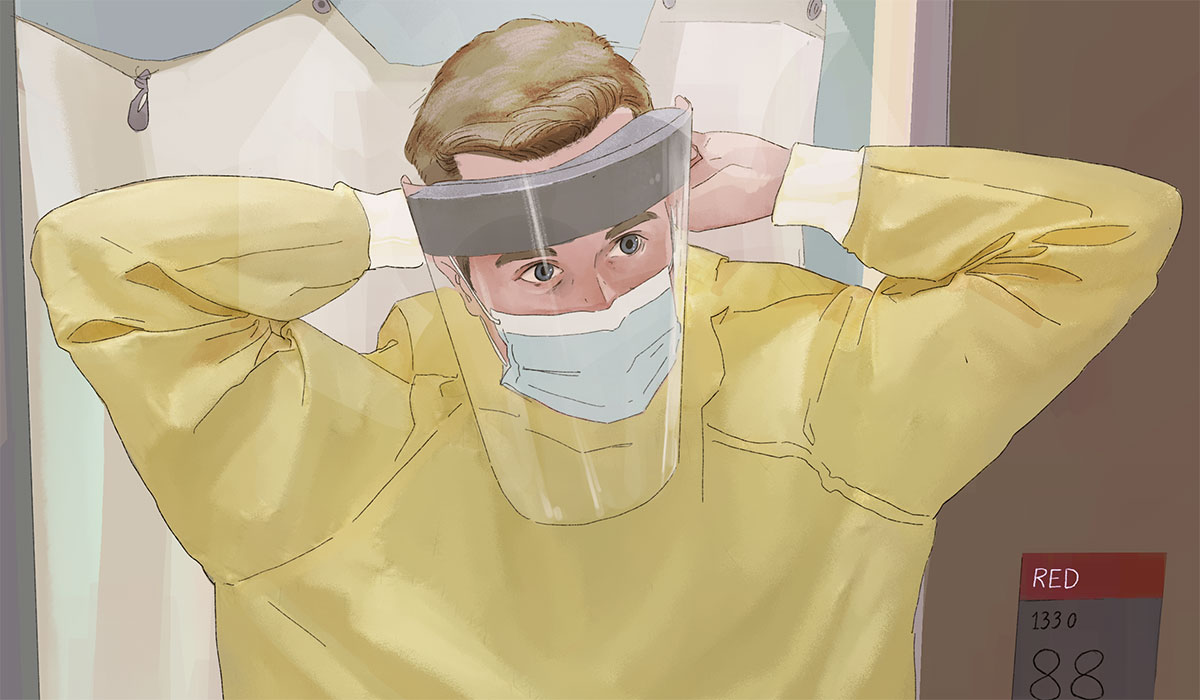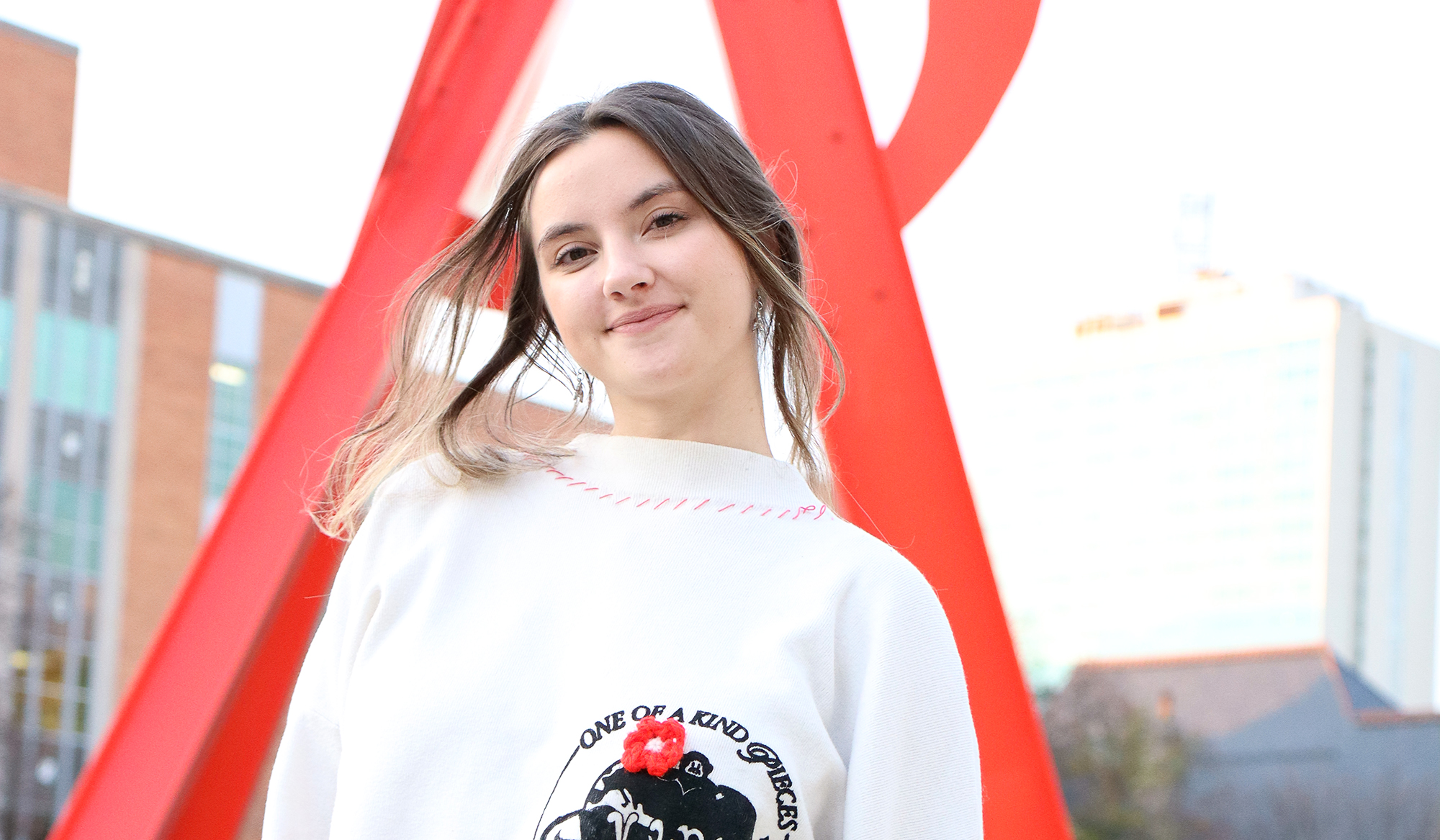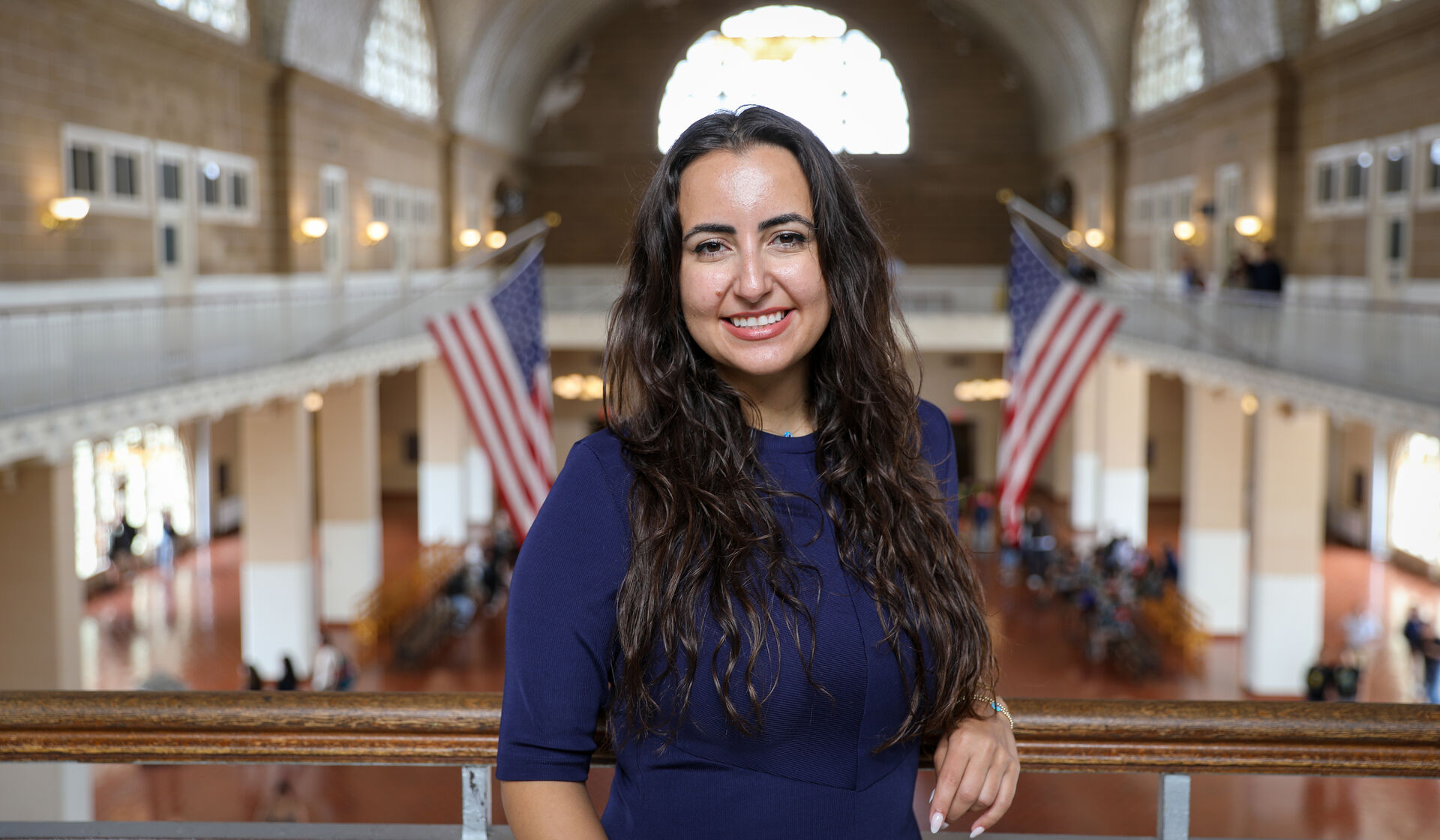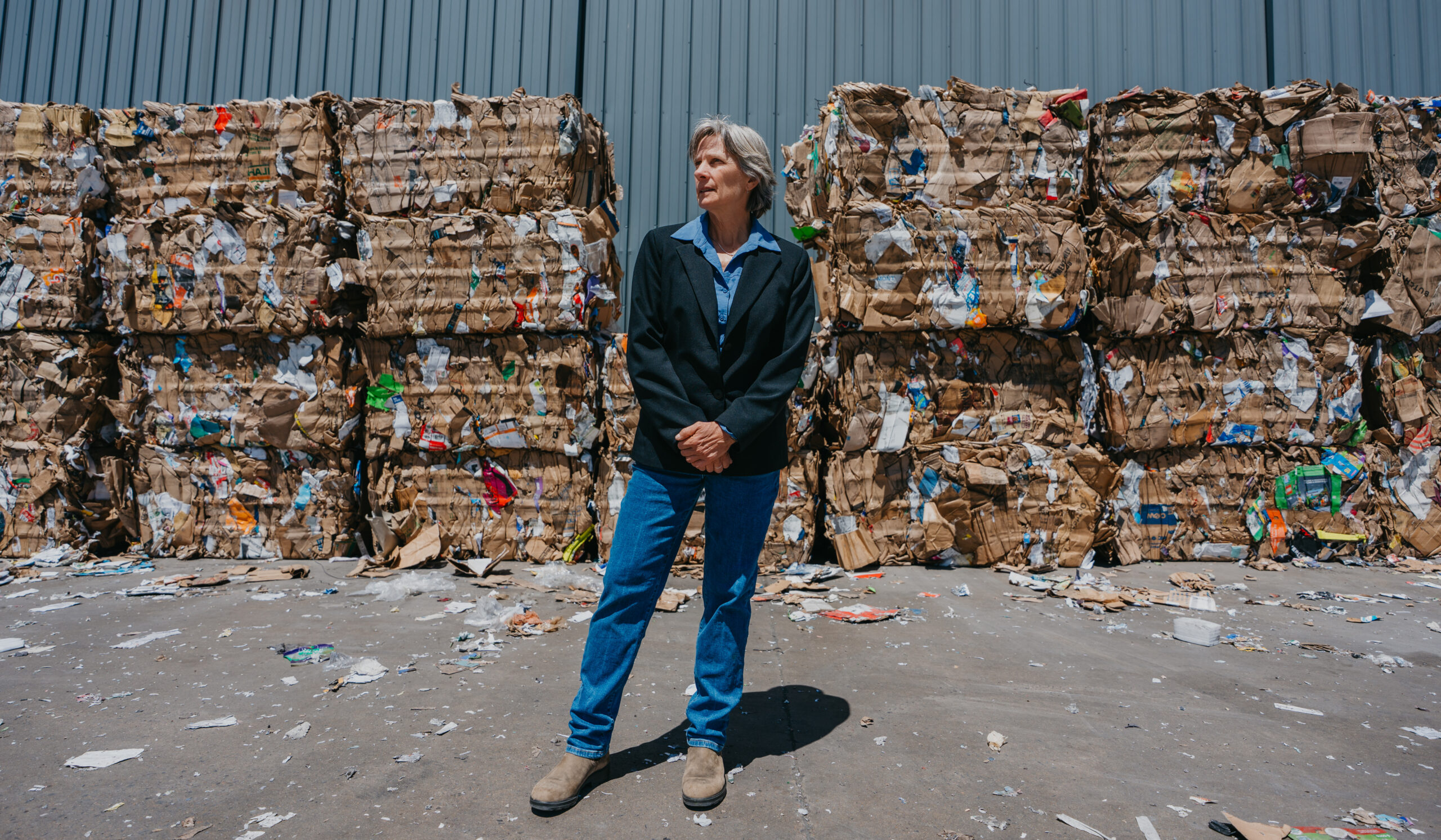More than a year has passed since COVID-19 first turned the world upside down — in the U.S. alone (as of press time), it has infected 30 million people, claimed more than 500,000 lives, and thrown millions of people out of work. Behind all of these numbers are individual stories. For some U-M alumni, the changes have presented unexpected opportunities; for others, they’ve caused incredible hardship.
The Emergency Room Doctor
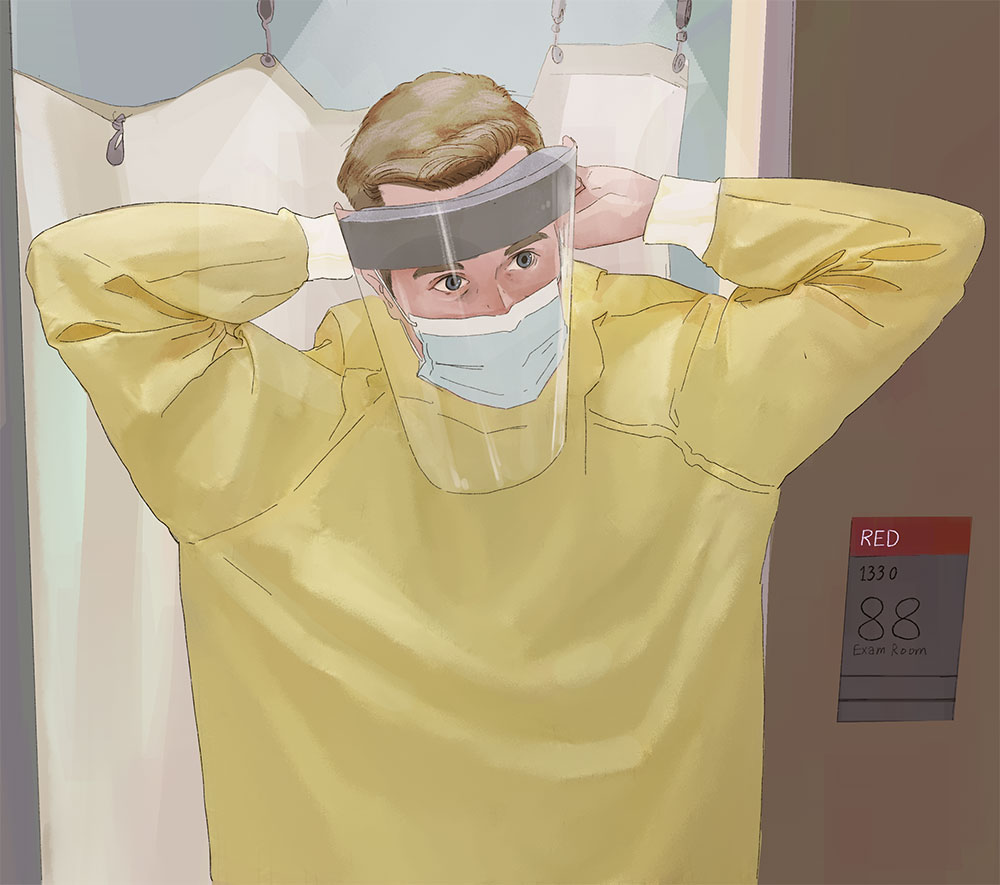
David Burkard, ’14, is just three years into his residency, but he’s been on the front lines of the pandemic from the start as an emergency room doctor at Spectrum Health Butterworth Hospital in Grand Rapids, Michigan. He’s seen an incredible amount of heartbreak during that time, including countless patients taking their last breath and saying goodbye to their loved ones over the phone. But he never worried about his own health because he’s young, active (a runner and volleyball coach), and not considered high risk.
Then, in November 2020, he developed symptoms.
“I knew right away it was COVID,” Burkard says of the fever, cough, and fatigue he experienced. He tested positive for the virus, quarantined at home, and thought he was improving after three days. But on the sixth day of his symptoms, his health deteriorated quickly and he began struggling to breathe. So he went straight to his hospital and walked into the emergency room as yet another patient gasping for breath.
He was admitted for three days and, from his hospital bed, wrote a Facebook post that went viral. It warned people to take the virus seriously and wear masks. “It does not just affect the old and frail; it affects all of us and we are all at risk for getting sick,” he shared. The post that he thought only friends and family would see prompted thousands of views and countless media interviews. Michigan Gov. Gretchen Whitmer, HLDD’19, even mentioned his story during a press conference.
Burkard found it all a bit overwhelming and wanted only to get back to his job. However, it took about four weeks before he was able to fully return. Once he did, he immediately volunteered to go into the COVID intensive care unit, just as his hospital became the busiest it had ever been. “It was one of the more challenging and rewarding things I have done,” Burkard says. “But I’m very thankful that I was able to use my experience to relate better to patients’ families.
The Broadway Actor
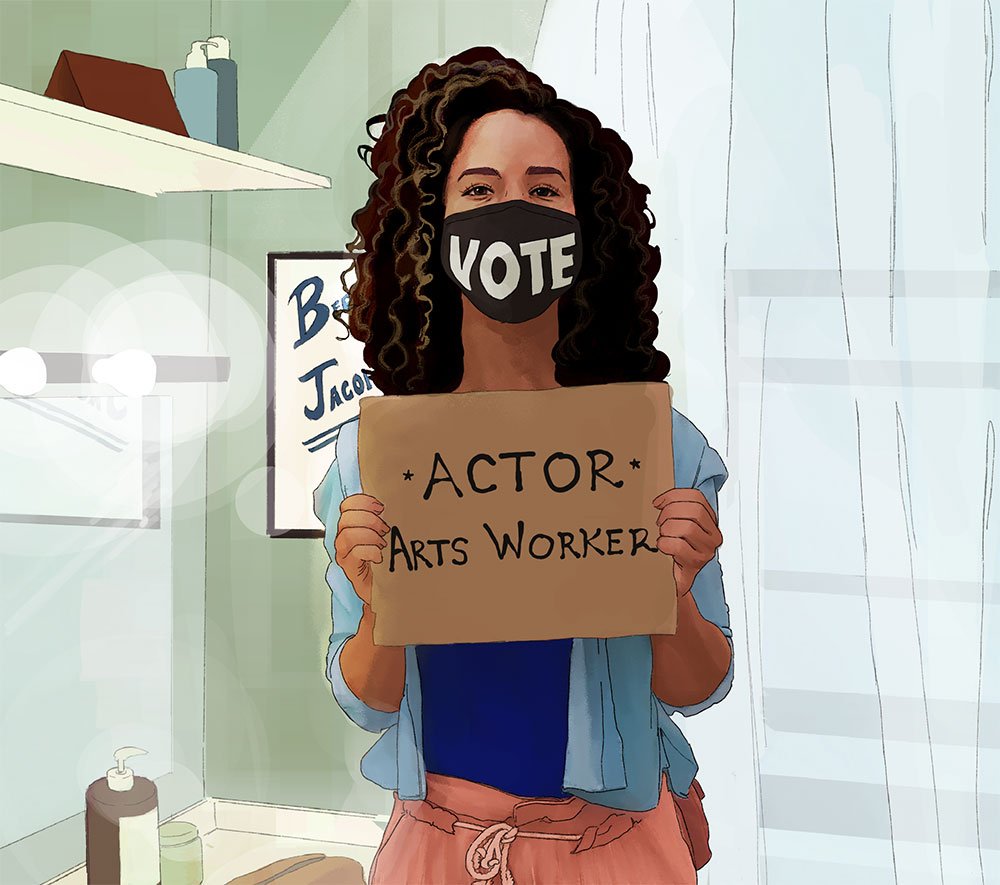
Britney Coleman, ’11, can remember what happened as if it was yesterday. She was getting fitted for her costumes as the understudy to the lead role in the Broadway revival of “Company.” The show was a little more than a week out from opening night. Previews at the Bernard B. Jacobs Theatre had been going well, and the show had a ton of buzz. Its cast was replete with Tony Award winners, and, for the first time, composer Stephen Sondheim had given permission for a woman to play the male lead — the same role Coleman was going to understudy.
She jumped on a phone call with the entire cast and crew right after her costume appointment; that’s when they learned that Broadway was going dark for four weeks.
“It was wild. Everyone was flabbergasted because nothing like this has ever happened on Broadway before,” Coleman says. The closure was extended and, a year later, the lights of Broadway remain dark. Going from a rigorous schedule to a far slower one has been challenging, but Coleman mentions the silver linings, including new professional opportunities.
Through the nonprofit Sing for Hope, she’s been performing virtually for people in nursing homes and hospitals and for corporate groups. “Singing for these senior citizens and seeing the joy that it brings them and the healing power of music has been really beautiful,” she says. Coleman has curated at least a dozen 45-minute concerts and has been inspired to turn them into a one-woman show when the pandemic is over. She’s also teaching theater master classes over Zoom and helping U-M’s Department of Musical Theatre curate this year’s “Senior Showcase” and with auditions for admission into the department.
Despite the ups and downs of the past year, Coleman is looking forward to getting back on stage when it’s safe to do so. She booked for her first performance since the start of the pandemic — she’ll play Guenevere in an outdoor production of “Camelot” in Sarasota, Florida. The production requires COVID protocols for the actors and crew to follow.
As for “Company”: “Because there is a buzz about this show, and we have a smaller cast, we will be one of the first shows to open when the time comes,” Coleman says. “So I do feel really lucky to be in a show that is coming back because not all actors have been so lucky.”
The Co-founder of STAT
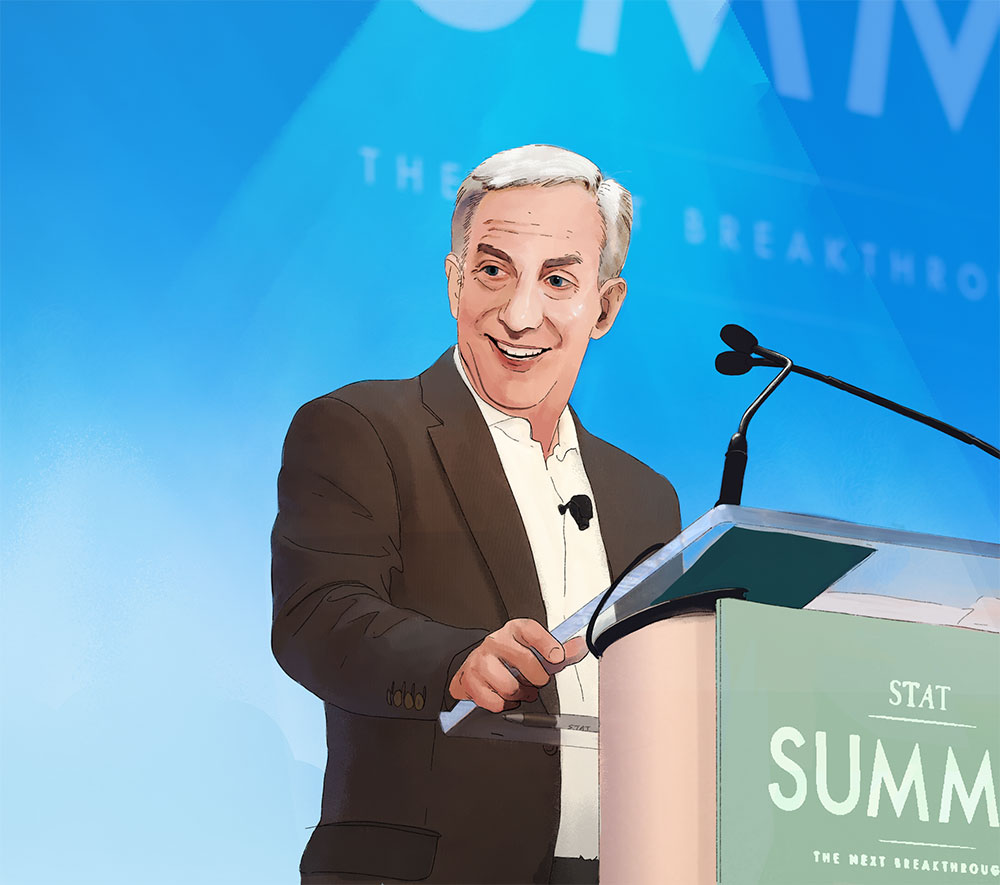
When Rick Berke, ’80, assumed his role as co-founder, executive editor, and employee No. 1 of STAT, a health-oriented website, he looked forward not only to the opportunity to build something, “but also to create and produce important journalism.” Little did he know in 2015 that, five years later, the pandemic would cause the site to become the go-to source for news about all things COVID.
The venture was a journalistic success from the start. Berke credits the site’s experienced reporters, many of whom come from The New York Times, The Washington Post, and other major publications. “They gave us instant credibility,” he says. The aim of the website is to spin complicated topics related to health, medicine, and science into engaging stories.
Berke himself has been a part of the journalism industry his entire life. He started his first newspaper in elementary school, was managing editor of The Michigan Daily, and spent 28 years at The New York Times in a variety of editorial roles, including assistant managing editor of both news and features.
The website got off to a healthy start — readership was at about 1.5 million unique visitors a month when the pandemic hit and changed everything; growth then became exponential.
“COVID has been a real inflection point for STAT, and there’s no turning back,” Berke says. “STAT will never be the same from what we were pre-pandemic.”
The site lifts the pay wall for much of its pandemic-focused journalism and offers paid subscriptions for other content. Berke says all areas have seen growth. Traffic reached more than 23 million unique visitors a month at one point and has now plateaued at about 7 or 8 million a month — far above what was expected for the venture when it launched.
Most importantly, Berke says at a time when journalism is under assault and many question the objectivity of news outlets, STAT has become a trusted resource.
“We have very high standards and high ambitions for what we do. Our aim is for every story to make a difference and for every story to give you something that you’re not going to get somewhere else,” he says. “I think we all feel very grateful that this work has given us a mission during this otherwise very difficult year.”
The USA Gymnastics President and CEO

Following the postponement of the last year’s Summer Olympics, four countries — China, Japan, Russia, and the U.S. — came together in November for the 2020 Friendship and Solidarity Competition. An artistic gymnastics event, it allowed for the testing of COVID safety protocols in the hopes of paving the way for the 2021 Summer Olympics in Tokyo. Among the U.S. delegation was Li Li Leung, ’95, the president and CEO of USA Gymnastics.
“We were happy to be able to compete,” Leung says. “We were excited to be able to do our part to contribute to the Olympics happening.”
A one-time artistic gymnast and former vice president of the NBA, Leung traveled with gymnasts, coaches, judges, and administrators to Tokyo for about a week. All followed strict public health guidelines that included private travel and lodging, medical surveys, daily COVID tests, and multiple temperature checks each day. Delegations created a “bubble” for several days upon arriving in Tokyo, leaving their hotel rooms only for meals in a walled-off dining area and to visit the competition site.
“It gave us a chance to really bond,” Leung says. “The whole U.S. travel delegation had to stay on one hotel floor, and we were not able to mix with any of the other delegations from the other countries. We were not allowed to sit at round tables while eating. We had to sit at conference-style seating, at least 6 feet apart, facing the same way when we ate.”
Leung says the protective measures worked, and she hopes the Olympics will take place this summer.
“If the Olympics are able to happen, it does provide this ray of hope and brightness and definitely does feel like something positive for the entire world to rally around,” Leung says. “Our athletes have trained their whole lives to be able to compete in the Olympics, so we’re doing everything that we can to support them to make their dreams come true.”
The Owner of Amer’s Deli
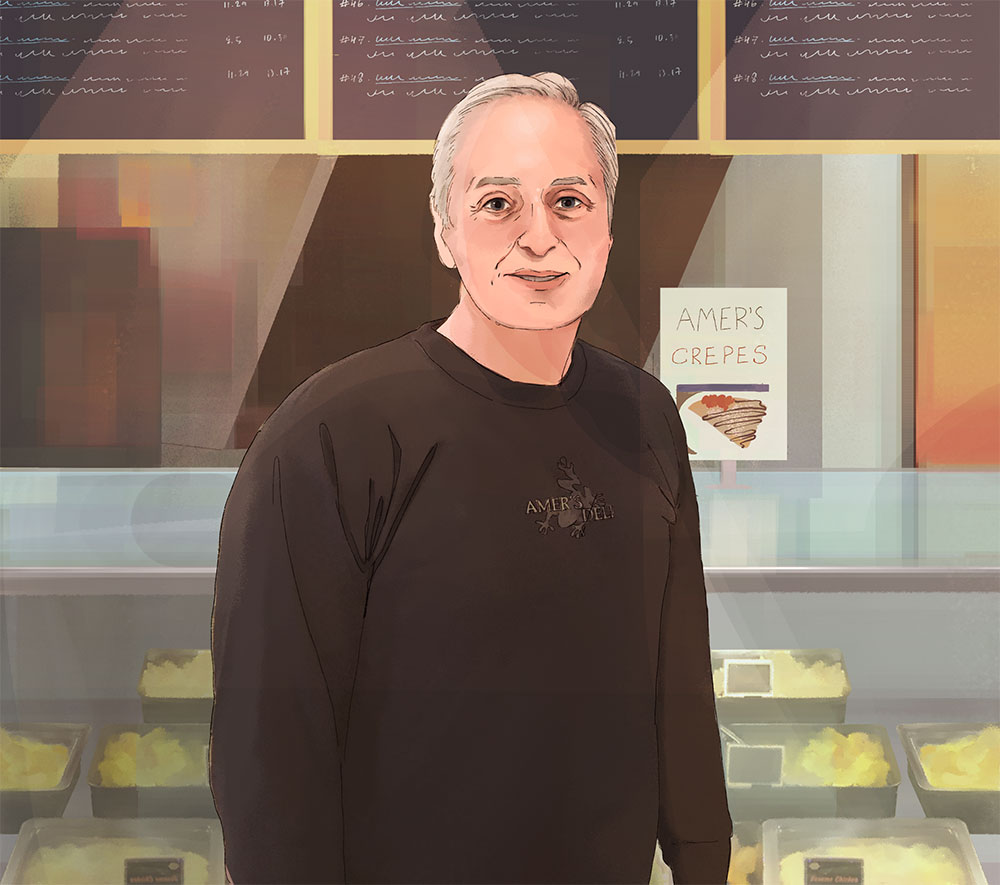
Like many restaurateurs, Amer Bathish, ’87, has experienced the highs and lows of the business, whether due to the state of the economy, the cost of leases, or the comings and goings of students during the academic year.
At its peak, Amer’s Deli had 250 employees and nine locations, including those most familiar to U-M students — one on State Street and one on Church Street in Ann Arbor. Over time, he closed and consolidated stores and dealt with his fair share of hardships, but nothing prepared him for the pandemic.
“It’s been devastating,” Bathish says. “All of a sudden, sales at our Church Street location went from $3,000 a day to $84 a day.” As the pandemic stretched on, he closed all but his original shop on State Street and let all but one employee go. These days, he works from 8 a.m. to 8 p.m. with one of his daughters — doing all he can to keep the business going.
“In 33 years of business, I’ve ridden and withstood any wave coming at me, no matter how big,” says Bathish, also an avid wind surfer. “I’ve had ups and major downs. I’ve lost businesses and leases and even so, this is by far 100 times harder than anything I’ve ever experienced.”
But he says he is incredibly thankful for his devoted customer base — some of whom will pay an extra $100 with their sandwich order to help him out and many who contributed to a GoFundMe effort in 2020, which raised $11,000 — almost enough to cover one month’s rent at his State Street deli.
“People have been generous, and everything helps. As hard as it is, I’m not going to let this last shop go. There are way too many memories here for me and for so many others,” he says. “We have been the meeting place for future marriages, friendships, and Ann Arbor connections. We have been privileged enough to serve students who come back to visit their children here at U-M. We have so many valued and loyal customers. So I’ve just got to hold on. I’ve ridden the waves all of my life, and it’s taken me to the lowest of the low but I know we will come back up again, too.”
Show Your Support for Alumni-Owned Businesses
The Alumni Association offers a directory of alumni-owned small businesses. Each listing contains information on the business and how you can support your fellow Wolverines. You can search or filter the listings by city, state, and country. If you are an alum who owns a small business, visit the site to submit your information. Note that the listings, updated weekly, do not represent an endorsement by the Alumni Association, nor will any financial support be provided by the Alumni Association. All businesses and listings are subject to review and posted at the discretion of the Alumni Association.
Jennifer Davis, ’95, is a producer and writer based in Washington, D.C., who runs her own company, Jennifer Davis Media Group. Connect with her on LinkedIn or Twitter @JenniferDavisDC.

